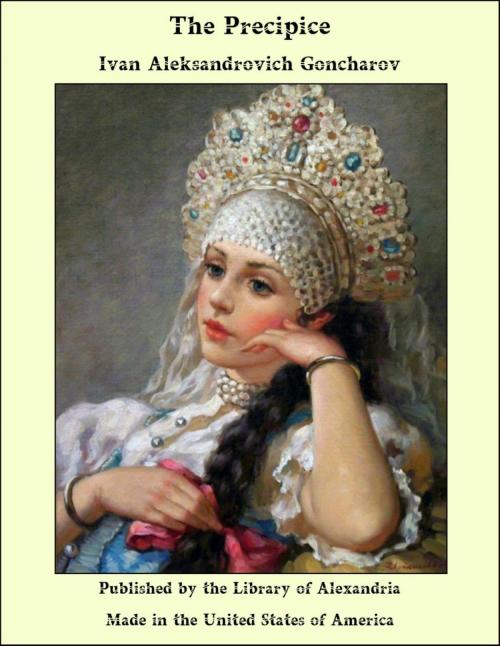| Author: | Ivan Aleksandrovich Goncharov | ISBN: | 9781465544995 |
| Publisher: | Library of Alexandria | Publication: | March 8, 2015 |
| Imprint: | Language: | English |
| Author: | Ivan Aleksandrovich Goncharov |
| ISBN: | 9781465544995 |
| Publisher: | Library of Alexandria |
| Publication: | March 8, 2015 |
| Imprint: | |
| Language: | English |
Ivan Alexandrovich Goncharov (1812-1891) was one of the leading members of the great circle of Russian writers who, in the middle of the nineteenth century, gathered around the Sovremmenik (Contemporary) under Nekrasov's editorship—a circle including Turgenev, Dostoyevsky, Tolstoy, Byelinsky, and Herzen. He had not the marked genius of the first three of these; but that he is so much less known to the western reader is perhaps also due to the fact that there was nothing sensational either in his life or his literary method. His strength was in the steady delineation of character, conscious of, but not deeply disturbed by, the problems which were obsessing and distracting smaller and greater minds. Tolstoy has a characteristically prejudiced reminiscence: "I remember how Goncharov, the author, a very sensible and educated man but a thorough townsman and an aesthete, said to me that, after Turgenev, there was nothing left to write about in the life of the lower classes. It was all used up. The life of our wealthy people, with their amorousness and dissatisfaction with their lives, seemed to him full of inexhaustible subject-matter. One hero kissed his lady on her palm, and another on her elbow, and a third somewhere else. One man is discontented through idleness, another because people don't love him. And Goncharov thought that in this sphere there is no end of variety." In fact, his greatest success was the portrait of Oblomov in the novel of that name, which was at once recognised as a peculiarly national character—a man of thirty-two years, careless, bored, untidy, lazy, but gentle and good-natured. In the present work, now translated for the first time into English, the type reappears with some differences. Raisky seems to have been "born tired." He has plenty of intelligence, some artistic gifts, charm, and an abundant kindliness, yet he achieves nothing, either in work or in love, and in the end fades ineffectually out of the story. "He knew he would do better to begin a big piece of work instead of these trifles; but he told himself that Russians did not understand hard work, or that real work demanded rude strength, the use of the hands, the shoulders, and the back," "He is only half a man," says Mark Volokov, the wolfish outlaw who quotes Proudhon and talks about "the new knowledge, the new life." This rascal, whose violent pursuit of the heroine produces the tragedy of the book, is a much less convincing figure, though he also represents a reality of Russian life then, and even now.
Ivan Alexandrovich Goncharov (1812-1891) was one of the leading members of the great circle of Russian writers who, in the middle of the nineteenth century, gathered around the Sovremmenik (Contemporary) under Nekrasov's editorship—a circle including Turgenev, Dostoyevsky, Tolstoy, Byelinsky, and Herzen. He had not the marked genius of the first three of these; but that he is so much less known to the western reader is perhaps also due to the fact that there was nothing sensational either in his life or his literary method. His strength was in the steady delineation of character, conscious of, but not deeply disturbed by, the problems which were obsessing and distracting smaller and greater minds. Tolstoy has a characteristically prejudiced reminiscence: "I remember how Goncharov, the author, a very sensible and educated man but a thorough townsman and an aesthete, said to me that, after Turgenev, there was nothing left to write about in the life of the lower classes. It was all used up. The life of our wealthy people, with their amorousness and dissatisfaction with their lives, seemed to him full of inexhaustible subject-matter. One hero kissed his lady on her palm, and another on her elbow, and a third somewhere else. One man is discontented through idleness, another because people don't love him. And Goncharov thought that in this sphere there is no end of variety." In fact, his greatest success was the portrait of Oblomov in the novel of that name, which was at once recognised as a peculiarly national character—a man of thirty-two years, careless, bored, untidy, lazy, but gentle and good-natured. In the present work, now translated for the first time into English, the type reappears with some differences. Raisky seems to have been "born tired." He has plenty of intelligence, some artistic gifts, charm, and an abundant kindliness, yet he achieves nothing, either in work or in love, and in the end fades ineffectually out of the story. "He knew he would do better to begin a big piece of work instead of these trifles; but he told himself that Russians did not understand hard work, or that real work demanded rude strength, the use of the hands, the shoulders, and the back," "He is only half a man," says Mark Volokov, the wolfish outlaw who quotes Proudhon and talks about "the new knowledge, the new life." This rascal, whose violent pursuit of the heroine produces the tragedy of the book, is a much less convincing figure, though he also represents a reality of Russian life then, and even now.















